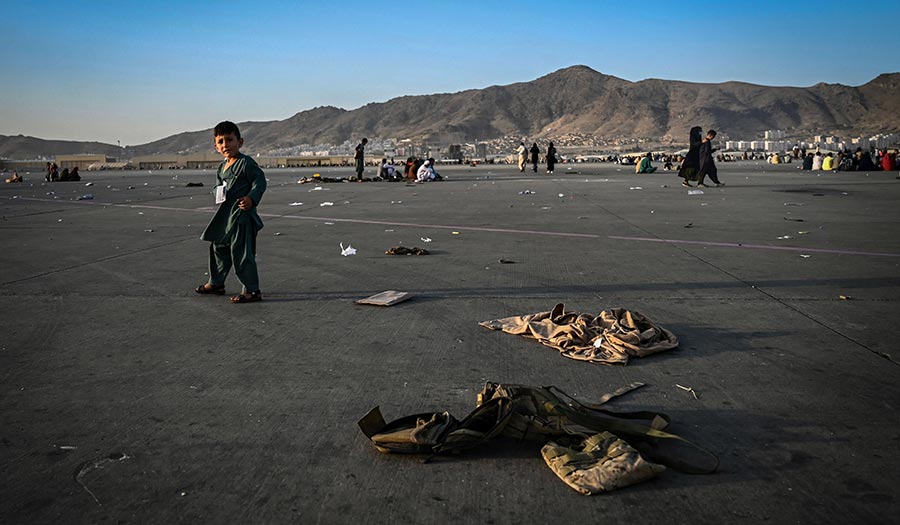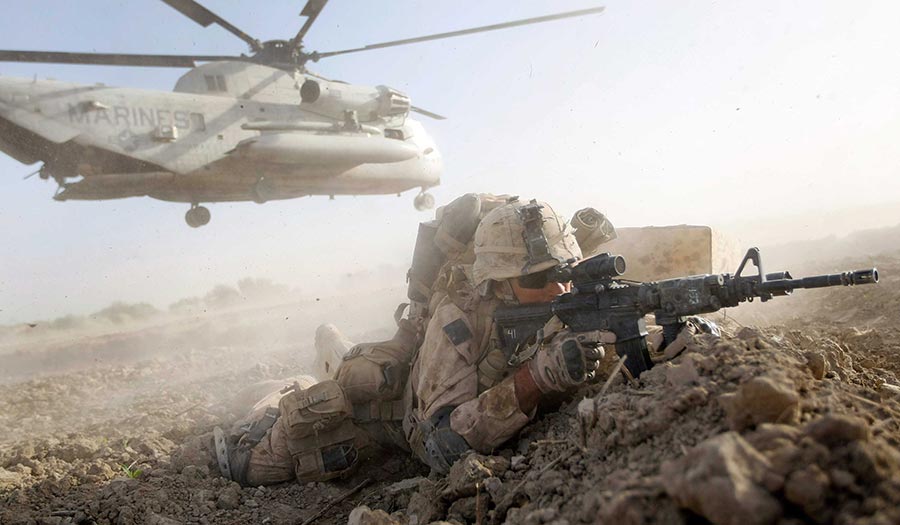 Wakil Kohsar/AFP via Getty Images
Wakil Kohsar/AFP via Getty Images
Article
Learn the why behind the headlines.
Subscribe to the Real Truth for FREE news and analysis.
Subscribe NowJust two weeks before the United States was set to complete its troop withdrawal after a costly two-decade war, the Taliban seized power in Afghanistan.
The insurgents stormed across the country with surprising speed, capturing all major cities in a matter of days, as Afghan security forces trained and equipped by the U.S. and its allies melted away.
As Afghans awake to a new reality of a hardline Islamic group in power, the West is left scratching its head over who is at fault for the swift collapse of Afghanistan’s forces.
NATO Secretary-General Jens Stoltenberg blamed a failure of Afghan leadership, but he conceded that the alliance must also address flaws in its military training program.
NATO has been leading international security efforts in Afghanistan since 2003 but wound up combat operations in 2014 to focus on training Afghanistan’s national security forces. NATO helped build up an army of some 300,000 troops, but that force withered in the face of the Taliban offensive in just days.
“What we have seen in the last few weeks was a military and political collapse at a speed which had not been anticipated,” Mr. Stoltenberg told reporters after chairing a meeting of NATO ambassadors.
Yet a significant majority of Americans doubt that the war in Afghanistan was worthwhile at all, according to a poll from The Associated Press-NORC Center for Public Affairs Research.
Roughly two-thirds said they did not think America’s longest war was worth fighting, the poll shows. Two-thirds also say the Iraq War that coincided with Afghanistan was a mistake.
At just short of 20 years, the U.S. combat mission in Afghanistan is America’s longest war. Because the U.S. borrowed most of the money to pay for it, generations of Americans will be burdened by the cost of paying it off.
Despite spending trillions of dollars, why did a war led by a military superpower fail to bring lasting change to Afghanistan?
How We Got Here
The U.S. can be added to a list of figures such as Alexander the Great and Genghis Khan, as well as Great Britain and the Soviet Union, who have all learned why CNN called Afghanistan a nation with “a reputation for undoing ambitious military ventures and humiliating would-be conquerors.”
“It’s a hard place to fight, to conquer and rule,” Patrick Porter, a lecturer in defense studies at the Joint Services Command and Staff College, Kings College London, told the news outlet.
“The geography is very hard: It is a country of mountains and deserts, of quite severe winters and that makes it difficult not only to fight in, but also to operate logistically. It limits your mobility and it is difficult to project power,” Dr. Porter said.
The Soviets were bogged down in Afghanistan from 1979 to 1989. The Afghan mujahedeen used guerilla warfare tactics to face down and ultimately defeat the powerful Russian army.
After the Soviets were dispelled, the Afghans understood they defeated a global military power. When the Soviet Union collapsed in 1991, the victors were further emboldened.
In 1994, the Taliban emerged and began seizing power and territory from various mujahedeen leaders. By 1996, the Sunni Islamic fundamentalist political group captured the Afghan capital of Kabul and set up a de facto government. They eventually held power over nearly three-quarters of the country. Meanwhile, tribal warfare in Afghanistan turned into a bloody civil war from the mid-1990s to 2001.
This is the turmoil into which America entered following 9/11.
Along with going after al-Qaida and defeating the Taliban, U.S. President George W. Bush’s “war on terror” sought to establish stability in Afghanistan. Yet America’s goal to install democratic institutions in a tribal and terroristic environment proved elusive, particularly after U.S. forces also focused their military and “democracy building” resources in Iraq.
After being voted into office by a war-weary citizenry, President Barack Obama attempted to breathe life into the flagging war with his 2009 decision to increase troop levels. Calling the conflict in Afghanistan “the good war,” the president sought to protect the Afghan population from continued Taliban attacks and help reintegrate insurgents into Afghan society.
By pouring more resources into the war effort, Mr. Obama only managed to increase the discontent of many Americans frustrated with a war that did not seem to end. His successor, President Donald Trump, attempted to bypass the Afghan government and negotiate with the Taliban directly only to see this latest effort fizzle.
As has happened repeatedly over the centuries, renewed efforts by America to control Afghanistan ultimately failed. The U.S.-supported Afghan military and police forces were unable to hold off the Taliban and, by the time the mission in Afghanistan formally ended in December 2014, the 13-year war was the longest fought by the United States.
Yet the United States’ mission in Afghanistan, unlike past attempts to exert influence in the region, has particularly hit home. Americans initially perceived the military effort there as a noble mission to spread democracy, dismantle terrorism, and promote stability.
In many ways, the U.S. has long wanted to share the blessings it has enjoyed with the rest of the world. This is a desire wired into our national thinking.
Consider all the traditional songs that ask God for success both domestic and abroad. Both “God Bless America” and “America the Beautiful” contain lines that evoke God and view Him as the source of well-being and prosperity for the nation.
Yet most sing these songs while glossing over these conspicuous references. There is a reason, though, that America and its history are intrinsically linked to the God of the Bible.
How to Make a Difference
Thousands of years ago, a promise was made by God to the offspring of the patriarch Abraham. Through a special birthright blessing, God revealed that his descendants, namely Ephraim and Manasseh, would “grow into a multitude in the midst of the earth” (Gen. 48:16). The older brother, Manasseh, was to “become a people, and he also shall be great: but truly his younger brother [Ephraim] shall be greater than he, and his seed shall become a multitude of nations” (vs. 19).
History reveals that only one pair of brother nations has ever become a singular great nation and a multitude of nations—the United States (Manasseh) and Britain with its former colonies (Ephraim). This, along with other undeniable proofs in the scriptures, proves that America—the most powerful and influential single nation to ever exist—is addressed in the Bible!
The blessings promised to these brothers are so abundant that they are described as becoming the standard for prosperity. The next verse states that surrounding peoples would even declare, “God make you as Ephraim and as Manasseh” (vs. 20).
The towering influence and sky-high standards of living in America, as with no other nation, are proof of the fulfillment of this. Other nations have craved for its success and striven for it, wishing—“If only we could be prosperous like them!”
Stop and think. U.S. citizens regularly sing about how God made America a nation—and ask Him to bless it. Yet few think of what these words really mean.
The promises to Abraham regarding the future nations of America and Britain were conditional. They were ensured through action. God fulfilled these promises due to the patriarch’s obedience.
Continued blessings require the same today.
Leviticus 26 plainly lays out how national blessings work. God says: “If you walk in My statutes, and keep My commandments, and do them” (vs. 3). What follows in the passage are the benefits the Creator will pour out for keeping His commands. Included are “rain in due season” (vs. 4) and “peace in the land…neither shall the sword go through your land” (vs. 6).
These blessings have historically been the case for the U.S. Since the Civil War, there have been no major military conflicts on our mainland! We have fought all our battles abroad.
But God has been drawing back those blessings from us. This is why our wars have become increasingly complex and ultimately unsuccessful. It is also why we have seen foreign attacks on our soil as God takes away His protection.
To receive God’s blessings of protection and success, Americans have to instead focus on obeying the source of these blessings.
Read our book America and Britain in Prophecy to see the way the U.S. must draw closer to God.
This article contains information from The Associated Press.
- World News Desk
- GEOPOLITICS
 Costs of the Afghanistan War, in Lives and Dollars
Costs of the Afghanistan War, in Lives and Dollars


